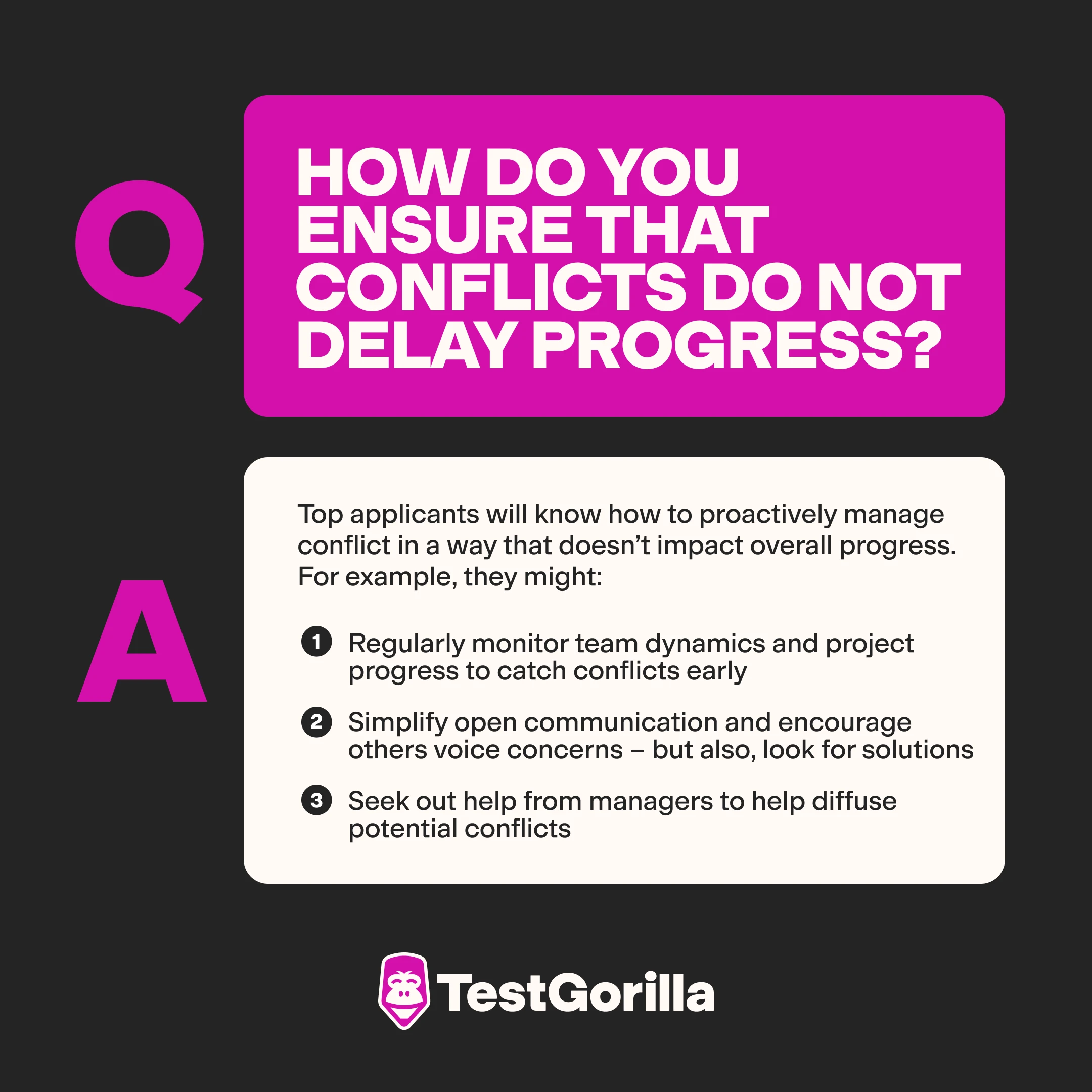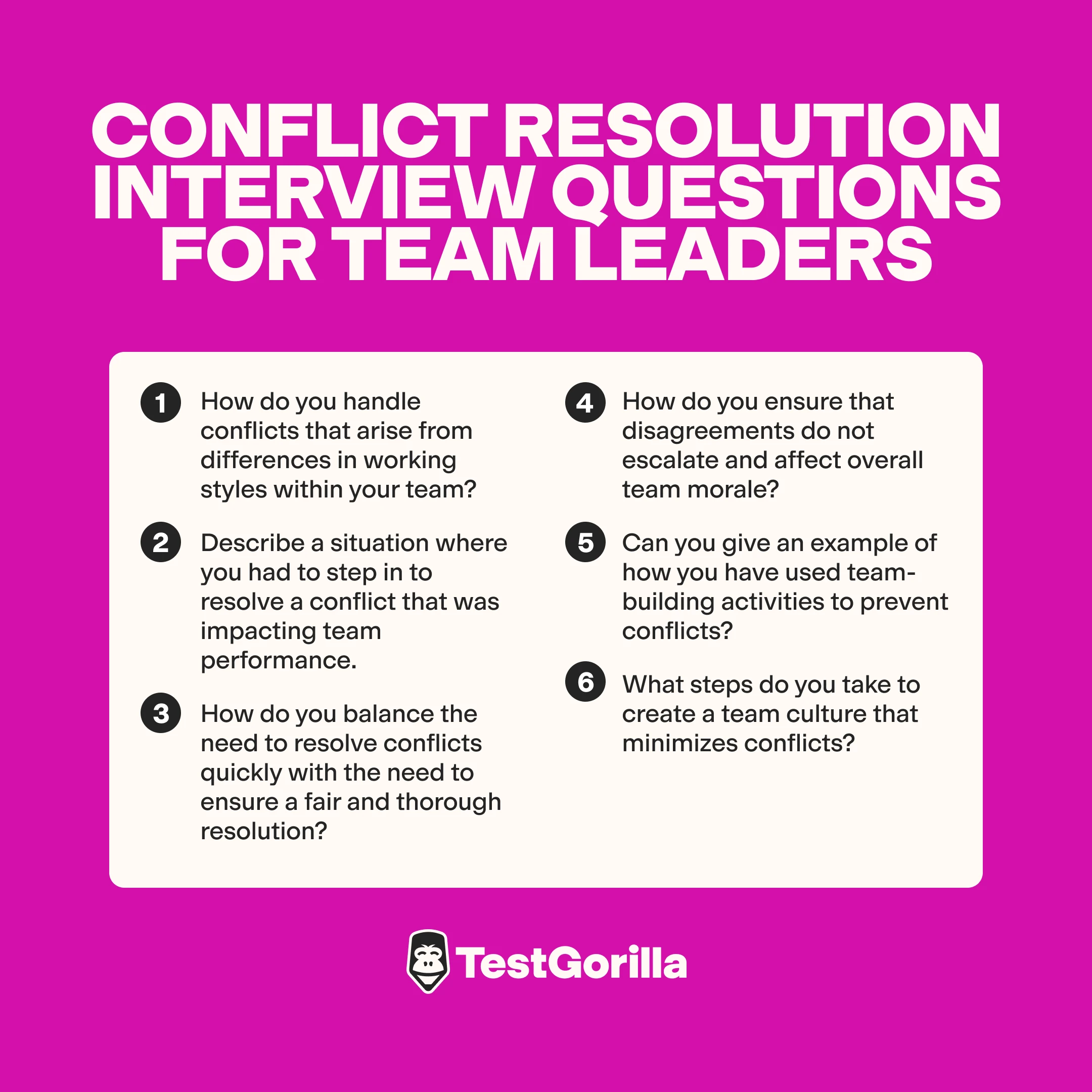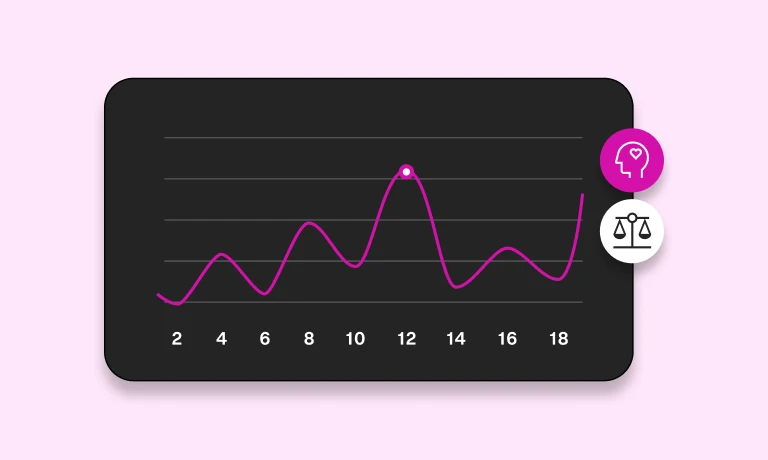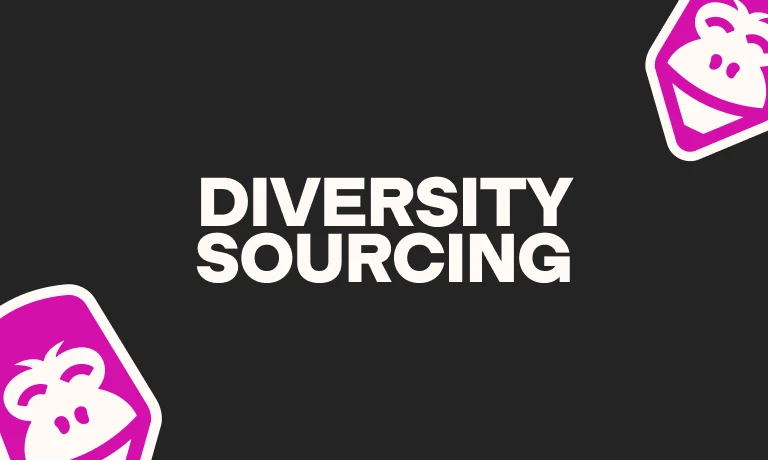54 conflict resolution interview questions to hire great team players
The ability to diffuse conflicts is key for any team and helps build a positive team culture – so, it’s a good idea to make sure candidates have it.
How? With the right conflict resolution interview questions.
To help you out, we’ve selected the best questions you can ask applicants to evaluate their conflict management skills, along with sample answers. To gain deeper insights into their abilities, you can also use a Communication or a Negotiation test at the top of your recruitment funnel.
This skill is essential for anyone working in a team – great team players know how to play well with others and resolve disagreements.
However, it’s particularly important for management and customer-facing roles, which is why we included 36 additional questions to help you evaluate candidates for those
Table of contents
- 18 conflict resolution interview questions to hire great team players
- 6 conflict resolution interview questions for team leaders
- 6 conflict resolution interview questions for project managers
- 6 conflict resolution interview questions for sales representatives
- 6 conflict resolution interview questions for HR professionals
- 6 conflict resolution interview questions for account managers
- 6 conflict resolution interview questions for technical support representatives
- Assess conflict management skills with the right interview questions
18 conflict resolution interview questions to hire great team players
In this section, you’ll find our selection of the best interview questions you can use to assess conflict resolution skills, along with our guidelines about what to expect from candidates and how to evaluate their responses.
1. Tell me about a situation where you had to mediate a dispute between two team members. What did you do?
Look for candidates who can describe a clear, step-by-step approach to mediation. The best candidates will mention:
Listening to both parties
Not casting blame or making accusations
Finding common ground
Facilitating open communication and dialogue
Suggesting a solution and implementing it
Following up to ensure it was effective
Candidates should also mention specific examples to illustrate their approach and the positive outcome of their mediation.
2. If you and your manager have different opinions on how to tackle a specific task, how do you reach an agreement?
Candidates should demonstrate a collaborative approach. Key points to listen for include:
Open communication and active listening
Supporting their position with evidence
Seeking compromise that’s acceptable for both parties
Maintaining a positive and professional relationship
The last part is particularly important – insisting to demonstrate you’re right at all costs could destroy relationships, and experienced candidates should know that.
3. Have you ever had to work with someone you found difficult to get along with? How did you manage the relationship?
Expect candidates to show maturity, professionalism, and self-awareness when answering this question. In such instances, they should acknowledge differences, adapt their approach and communication style to improve the relationship, and focus on common goals to make progress on the specific project.
4. What adjustments did you make to make working together easier?
Follow up on the previous question with this one to see whether candidates were able to demonstrate flexibility and problem-solving in practice. Look for specific examples of strategies they used, such as to:
Change their communication style to adapt to the other person
Set clear expectations and boundaries about roles and responsibilities
Find common ground and defining goals together
Use tools like Trello, Asana, or Monday.com to organize tasks and track progress
The best candidates might mention regularly checking in with the other person to see if the relationship could be improved further.
5. Tell me about a time when you had to give negative feedback to a coworker. How did you prepare for it?
Look for candidates who take a structured and empathetic approach. They should explain how they:
Prepared carefully and chose an appropriate time and setting for the conversation
Framed their feedback in a constructive manner, focusing on behavior and actions rather than personal attributes
Showed empathy by considering the other person’s feelings and perspective
Offered help or resources to support the other person
A good response will include a specific example of positive changes resulting from their feedback.
6. What was their response?
Candidates should provide honest insights into how the feedback was received and their reaction to it. Look for mentions of the other person’s initial response, whether it was defensive, accepting, or somewhere in between, as well as the candidate’s approach and reaction.
The best answers will demonstrate their ability to handle difficult conversations maturely and professionally.
Use a Communication test to go a step further and gain deeper insights into candidates’ skills.
7. Have you ever had to handle a disagreement that impacted a project's timeline? What did you do to resolve it?
Here, candidates should show strong problem-solving and negotiation skills. Look for examples where they identified the core issue, talked to others to find a solution, and implemented specific actions to resolve the problem.
Expect them to also explain how they adjusted the project plan or resources to minimize impact. Use our Negotiation test to evaluate applicants’ ability to reach agreements that are beneficial for everyone.
8. Imagine the following: Two members of your team disagree on a key strategy and have reached an impasse. What would you do to de-escalate the situation?
Look for candidates who have a balanced approach to mediation. They should describe how they would bring both parties together to discuss their perspectives openly in a calm and structured way. Ideally, they’d ensure each member can explain their position without interruption and look to understand the root of the disagreement.
Candidates should mention working towards finding common ground or a compromise that aligns with the team's overall goals.
9. What techniques do you use to ensure everyone’s opinions are heard during heated discussions?
Here, candidates might talk about setting ground rules for discussions to ensure respect and turn-taking. Look for descriptions of actively inviting quieter team members to share their views, possibly by going around the room to give everyone a chance to speak.
Candidates might also mention techniques such as using open-ended questions to encourage deeper insights. The best responses will include specific examples showing how these techniques helped improve the quality of team meetings.
10. How do you handle situations where you disagree with the opinions of the majority during meetings?
Great team players will show professionalism and a willingness to collaborate. They should describe how they’d present their point of view, backed by data or solid reasoning, while remaining open to the perspectives of others.
Effective answers will show their ability to remain calm and composed, ensuring that their approach does not disrupt the meeting's dynamics. Look for examples where their ability to diplomatically handle such situations led to better decisions or outcomes for the team.
11. How do you address disagreements that arise because of differences in communication styles?
Candidates might describe identifying each team member’s preferred communication style and adjusting their approach accordingly.
Look for examples where they facilitated discussions about these differences and used specific strategies, such as setting boundaries, identifying common goals, using non-violent communication, and setting regular one-on-one meetings to make sure everyone is on the same page.
12. What specific strategies do you use to prevent conflicts? Can you give an example of when these strategies were effective?
Here, candidates might talk about building an open and transparent communication culture, where team members feel comfortable voicing their concerns and objections.
Effective responses will include examples such as implementing team-building activities to improve relationships or setting up anonymous feedback channels to surface hidden tensions.
Candidates should provide a specific instance where their preventive strategies identified and addressed a potential conflict early, resulting in a positive outcome for the team.
13. Can you tell me about a time when a minor dispute had the potential to escalate into a major team-wide issue? How did you prevent it from getting worse?
Look for stories where candidates intervened early, bringing team members together to discuss issues and working collaboratively to find a resolution. Effective answers will show how they observed the situation after the initial resolution to ensure the issue did not come up again.
14. When dealing with multiple conflicts simultaneously, how do you prioritize your actions?
Look for applicants who would prioritize conflicts based on urgency and impact, addressing the most critical ones first. Examples of delegating tasks to trusted team members and maintaining clear communication are a plus. Effective responses will include instances where their prioritization and time management skills enabled them to handle multiple conflicts without harming team morale. To assess applicants’ prioritization skills, use our Time management test.
15. How do you handle a situation where two team members have a fundamental disagreement on the best approach to a project?
Candidates should explain how they help others resolve disputes. They should mention letting each person share their side, listening carefully to both, and negotiating a common ground for how to approach the issue.
Look for examples where they found a compromise that worked for everyone. Great answers will include examples of times when their mediation led to a solution that helped the team work better together.
16. You notice a team member is creating tension between others with rumors and dishonest tactics. What do you do?
Look for examples of a proactive approach towards harmful behavior. Expect candidates to mention they’d gather evidence discreetly and talk privately with the person about their behavior and its impact.
Top candidates will set boundaries and give the team member a chance to improve. Great answers will include instances where they managed similar situations successfully and restored trust.
17. How do you ensure that conflicts do not delay progress?
Top applicants will know how to proactively manage conflict in a way that doesn’t impact overall progress. For example, they might:
Regularly monitor team dynamics and project progress to catch conflicts early
Simplify open communication and encourage others voice concerns – but also, look for solutions
Seek out help from managers to help diffuse potential conflicts
Strong responses will include examples where their early interventions kept conflicts from delaying project milestones.
18. How do you handle conflicts that arise from differences in project methodologies or approaches?
Look for applicants who are able to blend different methods and encourage discussions to create hybrid methods that meet project needs. Great answers will include specific instances where their mediation improved project efficiency and effectiveness.
6 conflict resolution interview questions for team leaders
Below, you’ll find six questions we picked to help you assess applicants for team management roles. Effective conflict resolution is a key skill for team leaders, so make sure you assess it during interviews.
How do you handle conflicts that arise from differences in working styles within your team?
Describe a situation where you had to step in to resolve a conflict that was impacting team performance.
How do you balance the need to resolve conflicts quickly with the need to ensure a fair and thorough resolution?
How do you ensure that disagreements do not escalate and affect overall team morale?
Can you give an example of how you have used team-building activities to prevent conflicts?
What steps do you take to create a team culture that minimizes conflicts?
The best insights on HR and recruitment, delivered to your inbox.
Biweekly updates. No spam. Unsubscribe any time.
6 conflict resolution interview questions for project managers
Project managers need to balance stakeholders’ requirements, teams’ resources, and project goals. For this, they need excellent conflict resolution skills, which you can assess with the questions below.
How do you manage disputes that arise from changes in project scope or timelines?
How do you handle conflicts that arise from resource allocation issues within a project?
Describe a time when you had to deal with a conflict that was impacting project delivery.
How do you manage disagreements that happen due to differences in priorities among project stakeholders?
Tell me about a time when you had to resolve a conflict related to project responsibilities and roles.
How do you manage conflicts that arise from project team members having different levels of experience or expertise?
6 conflict resolution interview questions for sales representatives
The ability of sales representatives and sales consultants to diffuse tense situations with potential or existing customers is key for achieving your sales goals. Assess skills with the following questions:
Describe a time when you had to work with a particularly difficult client. What was your approach and what was the outcome?
How do you handle heated sales negotiations and disagreements on price?
How do you deal with clients who are unhappy because your product didn't meet their expectations?
Describe a time when you had to resolve an issue that was affecting a long-term client relationship.
How do you make sure that competitiveness within your sales team doesn't spark disputes?
Tell me about a situation where you had to address a client's concerns related to contract terms or conditions.
6 conflict resolution interview questions for HR professionals
HR staff’s conflict management skills help ensure that all disputes between employees or between the company and employees are resolved fairly and swiftly, without impacting overall team morale.
Use the questions below to evaluate conflict resolution skills for HR roles.
How do you handle workplace harassment complaints?
Can you provide an example of a time when you had to address an issue related to employee performance?
In a hybrid work environment, what would you do if an employee complains about favoritism towards team members who come more often to the office?
How do you handle employee dissatisfaction with changes in company policies?
How do you manage conflicts that arise from personality differences?
How do you ensure that conflicts do not negatively impact overall employee morale?
6 conflict resolution interview questions for account managers
To keep clients happy and the business running smoothly, account managers need to handle disputes quickly and efficiently, without harming client relationships.
Use the questions below to make sure your future account managers know how to handle disagreements with clients.
Describe a time when you had to mediate a conflict between a client and your team. How did you resolve it?
Can you provide an example of a time when you had to address a client’s complaint about a missed deadline?
How do you ensure that client expectations are managed to prevent conflicts?
Describe a situation where you had to deal with a client who was dissatisfied with the pricing of your services.
How do you handle conflicts that arise from misunderstandings about contract terms or service agreements?
How do you balance maintaining a positive client relationship while enforcing company policies?
6 conflict resolution interview questions for technical support representatives
Dealing with customers’ technical complaints often means dealing with frustrated customers who have lost their patience. Knowing how to reduce tension in such situations is key for the success of your tech support team.
How do you handle a situation where a customer is angry due to a technical issue?
Can you provide an example of a time when you had to de-escalate a situation with a particularly upset customer?
How do you manage conflicts that occur when customers demand solutions outside of your company's support policies?
How do you address situations where a customer feels their issue is not being resolved quickly enough?
How do you ensure that conflicts with customers do not affect the overall morale of the support team?
Can you give an example of a time when your problem-solving skills helped resolve a conflict with a customer?
Assess conflict management skills with the right interview questions
For an in-depth evaluation of applicants’ skills, use a mix of skills assessments and structured interviews.
Skills assessments enable you to quickly identify top talent in your talent pool, while interviews give you an opportunity to evaluate candidates’ behavior, personality traits, and social skills.
This, in turn, helps you assess candidates’ strengths and weaknesses accurately and objectively and make informed hiring decisions.
To start building your first skills assessment, sign up for our Free forever plan. It comes with a free Communication test to help you hire strong communicators who know how to present their ideas clearly and concisely – a key element to resolving disagreements.
Or sign up for a free 40-minute live demo to chat with one of our experts and see whether our platform is the right fit for your business. We’d love to speak with you and help you build a skills-first hiring process.
You've scrolled this far
Why not try TestGorilla for free, and see what happens when you put skills first.




















